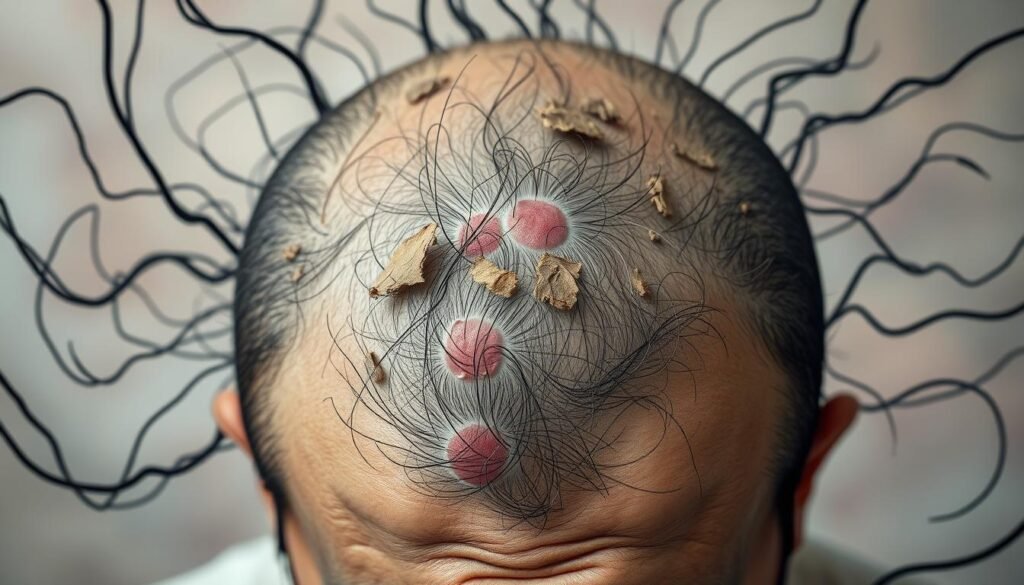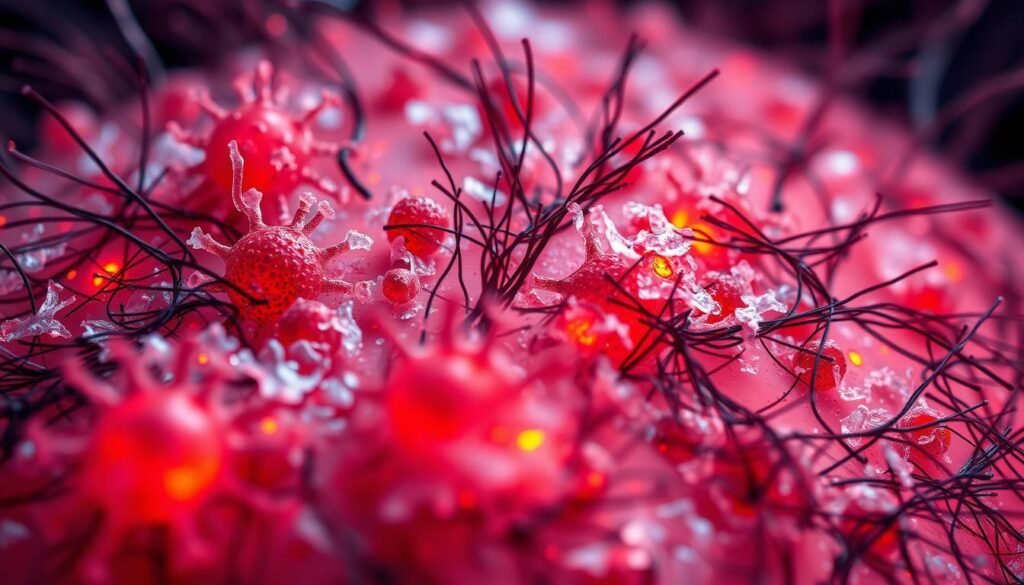Did you know half of adults get dandruff at some point? It’s not just about looks. Dandruff can make you feel itchy and self-conscious because of the scalp flaking. Knowing why dandruff happens is important for taking care of it. In this article, you’ll learn about things like seborrheic dermatitis, dry skin, and fungal infections. Understanding these can help you keep your scalp healthy.
Dandruff can come from many places, including what we eat and our lifestyle. Stress has a big impact on dandruff too. This article gives you the info you need to keep your scalp healthy. For more on dandruff, check out the Mayo Clinic.
Key Takeaways
- About 50% of adults experience dandruff.
- Dandruff can cause significant self-consciousness and discomfort.
- Common causes include seborrheic dermatitis and fungal infections.
- Environmental factors like dry scalp can worsen dandruff.
- Understanding dandruff triggers helps in managing symptoms effectively.
- Stress can significantly influence the severity of dandruff.
What is Dandruff?
Dandruff means you’re shedding dead skin cells from your scalp. It leads to flaking you can see and sometimes itchiness. It’s more than just flakes; it’s a sign your scalp’s health is off balance.
People with dandruff face different troubles. Symptoms range from a little itchy to a lot of flakes that others can see. While it’s not severe medically, it can make you feel less confident in social settings.
Things like changes in the weather or bad drying air can make dandruff worse. How you take care of your hair matters too. For deeper ideas on handling dandruff, check out Henry Ford Health.
Understanding Scalp Flaking
Scalp flaking happens when skin cells rejuvenate too quickly. Normally, old skin cells make way for new ones in a steady rhythm. But factors can upset this balance, causing excess cells to pile up and flake off. Knowing why scalp flaking occurs is key to keeping your scalp healthy.
There are several common reasons behind scalp flaking:
- Dryness of the scalp, which might come from the weather or not enough moisture.
- Reactions to hair products, like shampoos and conditioners with strong chemicals in them.
- Shifts in the scalp’s normal bacteria and fungi, possibly due to diet or health changes.
These factors can speed up how fast skin cells are replaced. This throws off the scalp’s natural harmony. Addressing these root causes can make a big difference in scalp condition and lessen flaking. For those dealing with ongoing scalp problems, finding the right treatments is crucial for sustainable comfort.
| Factor | Impact on Skin Cell Turnover |
|---|---|
| Dryness | Leads to quicker shedding of dead cells, causing flaking. |
| Product Irritation | Makes skin more sensitive and speeds up cell turnover. |
| Flora Imbalance | Interrupts the natural cycle, leading to more flakes. |
Dandruff: Causes
To fight dandruff well, knowing why it happens is key. Mainly, seborrheic dermatitis and too much Malassezia fungus cause it. This part explains how they make dandruff happen.
Seborrheic Dermatitis
Seborrheic dermatitis is a usual skin issue causing dandruff. It shows as red, oily skin with yellow scales. This mostly happens in oily parts like the scalp, face, and chest.
People with this condition face ongoing irritation and skin flaking. Handling it well can really lower dandruff.
Fungal Infection: The Role of Malassezia
Malassezia yeast lives on most people’s scalps. When there’s too much, dandruff starts. This fungus feeds on scalp oils, causing flaking and irritation.
| Factor | Description | Impact on Dandruff |
|---|---|---|
| Seborrheic Dermatitis | Common skin condition causing red patches and scales | Significant contributor to dandruff symptoms |
| Malassezia Overgrowth | Fungal infection leading to irritation and flaking | Directly linked to dandruff formation |
Dry Scalp vs. Dandruff
It’s vital to know the difference between dry scalp and dandruff for the right treatment. Both can make flakes show up on your scalp, but they are not the same. Each has unique causes and symptoms.
Dry scalp comes with feelings of tightness and mild itching. Flakes are small and not oily. This issue often happens when there’s not enough moisture. Dry air and not drinking enough water can be culprits.
Dandruff, however, is linked to conditions like seborrheic dermatitis or fungal infections. Dandruff differences include more inflammation and irritation. For those with dandruff, the itch and redness are worse. The flakes are also bigger and oilier compared to dry scalp.
Knowing these differences helps people find the right products and treatments. For dry scalp, treatments usually add moisture back. You might use oils or moisturizing shampoos. For dandruff, treatments might include special shampoos to tackle the root cause.
| Aspect | Dry Scalp | Dandruff |
|---|---|---|
| Causes | Insufficient moisture, environmental factors | Seborrheic dermatitis, fungal infections |
| Symptoms | Tightness, mild itchiness, small flakes | Significant irritation, inflammation, larger oily flakes |
| Treatment Focus | Hydration and moisture restoration | Antifungal and medicated solutions |
Common Triggers of Dandruff
Dandruff can be both uncomfortable and embarrassing. Knowing what triggers it can help people manage it better. Things like not cleaning your scalp well and using strong hair products can cause dandruff.
Poor Hygiene: How It Affects the Scalp
Not washing your scalp enough can cause skin, oils, and bacteria to build up. This can make dandruff worse. Washing your scalp often keeps it clean and healthy. Not doing so can lead to more irritation and dandruff.
Impact of Harsh Products on Scalp Health
Using hair products with sulfates and alcohol can dry out and irritate your scalp. This can increase flakiness, leading to dandruff. Choosing gentler products without sulfates can help. Picking the right products helps keep your scalp healthy.
| Factor | Impact on Scalp | Recommendations |
|---|---|---|
| Poor Hygiene | Leads to buildup of oils and dead skin cells | Regular cleansing routines |
| Harsh Hair Products | Irritates the scalp, causing flakiness | Use sulfate-free products |
The Influence of Stress on Dandruff
Stress plays a big role in scalp health but is often not talked about. Stress effects on scalp can make the scalp produce more oil, which helps dandruff grow. This shows how our feelings and physical health are connected.
Stress hormones change the scalp’s natural state. This makes a good environment for Malassezia, a yeast, to grow. It loves oily areas. The dandruff and stress connection is clear when dandruff gets worse during stressful times.

It’s important to handle stress to keep your scalp healthy. Using relaxation methods like meditation, yoga, or deep breathing can help lower stress. These activities are good for both your mind and scalp.
| Stress Management Techniques | Benefits for Scalp Health |
|---|---|
| Meditation | Reduces stress hormones, promoting scalp balance |
| Yoga | Improves blood flow to the scalp, enhancing nutrient delivery |
| Deep Breathing | Calms the mind, potentially minimizing dandruff flare-ups |
| Regular Exercise | Boosts mood, decreases stress, and supports skin health |
| Social Support | Provides emotional comfort, aiding in stress reduction |
Adding these practices to your daily routine can boost mental clarity and scalp health. This could mean less dandruff. Effectively dealing with stress leads to a healthier scalp without flakes.
Dietary Deficiencies and Their Connection to Dandruff
It’s key to eat well to fight dandruff. What you eat deeply impacts your scalp’s health. Key nutrients like omega-3s, zinc, and vitamins A and E are crucial. They keep the skin moisturized and healthy.
Essential Nutrients for Healthy Skin
Missing important nutrients can worsen dryness and irritation, making dandruff more of a problem. Getting enough of these nutrients helps your hair grow. It also soothes flaking and itching. Not eating enough of these can cause ongoing issues.
Foods to Incorporate for Scalp Health
Adding certain foods to your diet provides needed nutrients for healthy scalp. Such foods include:
- Fatty fish (like salmon)
- Nuts (walnuts, almonds)
- Leafy greens (spinach, kale)
- Avocados
Eating these foods helps fight off dietary lacks and keeps your scalp healthy. Choosing nutrient-dense foods is vital to lessen dandruff problems.
How the Immune System Affects Dandruff
The scalp’s health is deeply tied to the immune system impact. A strong immune system keeps various microbes, like Malassezia, in check. If the immune system weakens, the body struggles to control these fungi. This can lead to dandruff and seborrheic dermatitis.
Studies show that people with weaker immunity often have worse dandruff. This vulnerability can create a cycle. Dandruff gets worse, causing skin irritation, which then weakens the immune response even more. Managing dandruff and immunity is key to reducing these issues.
| Factor | Impact on Dandruff |
|---|---|
| Strong Immune Response | Regulates Malassezia levels, minimizing dandruff |
| Weakened Immune Response | Facilitates fungal overgrowth, worsening dandruff |
| Nutrition | Supports immune function, aiding in dandruff management |
| Sleep | Enhances immune health, reducing dandruff severity |
| Exercise | Boosts immune resilience, aiding in scalp health |
A well-rounded lifestyle can greatly improve scalp conditions. Regular exercise, good nutrition, and enough sleep are critical. For more insights on how immunity affects dandruff, check out this resource. Knowing this can help tackle dandruff more effectively.

Home Remedies for Dandruff
Dandruff is a common issue that many people deal with. Luckily, there are several natural remedies that can help reduce dandruff symptoms. A few top choices include:
- Tea Tree Oil: This essential oil is known for its anti-fungal abilities. It can help get rid of the fungi that cause dandruff.
- Coconut Oil: Not only does it moisturize the scalp, but it may also lessen dryness and flakiness.
- Apple Cider Vinegar: This is a great natural remedy for balancing scalp pH and combating fungal growth.
Using these remedies regularly can improve your scalp health. Include scalp massages with oils like almond or olive oil to boost circulation and promote healthy hair. Always do an allergy test before trying any new remedy.
If you still have dandruff after trying these solutions, consider seeking further help. A healthcare provider can suggest more personalized treatment options. For detailed dandruff management tips, visit this resource.
Conclusion
Dandruff is complex and needs a deep understanding of what causes it. It’s not just about looks but how healthy our scalp is. To manage dandruff well, we must change our lifestyle. This includes better personal hygiene and reducing stress.
Changing what we eat also helps a lot with dandruff problems. Eating foods rich in essential nutrients leads to healthier skin and scalp. By linking diet, hygiene, and stress management, we can find ways to help our scalp. This supports better hair growth too.
Dandruff is common, but it can be controlled with the right tactics. Paying attention to various factors helps improve dandruff. Over time, this leads to healthier hair and boosts our confidence.